- Home
- Gregory Maguire
Confessions of an Ugly Stepsister Page 14
Confessions of an Ugly Stepsister Read online
Page 14
“A long time ago.” Clara looks in a strange, pointed way at Iris, as if not sure that Iris isn’t a spirit, hasn’t squirreled her away here to drop her in a trapdoor again. “A long time ago happened to me, and I was a changeling. The crow man changed me. That’s all.”
Her expression is familiar. She is badly scared, and something more. “Come,” says Iris, “away from this place, whether you’re having a bad dream or not, let’s get out of this place.” But Clara is slow to move, and Iris has to tug her. Once outside, they find the wind more bitter, the clouds lower, and the temperature dropping still further. “No talking, let’s push on, and cocoa and butter at home to warm us up!” says Iris as gaily as she can. Caspar, damn him, has proven to be right. It’s too far back. Iris even worries that they’ve turned in the wrong direction. But eventually the huddled spires of Haarlem appear, and what’s left of the crowds still cavorting on the ice—mostly children and the poor. Everyone else has had enough.
They make the last few steps to the house in a stupor of exhaustion. Clara’s face is changed now; it’s vacant and far away. It doesn’t have the piercing look that it had in the clammy husk of the windmill. She doesn’t take any cocoa, she just climbs the stairs to bed, and though Iris would be glad to hear even the sound of weeping, there’s only silence from above. Later, as she’s falling asleep, Iris remembers when she saw that look on Clara’s face before. It was the look that she had in her eyes when she stared out the window at Ruth and told her, “Get away from here.” It was that look of being stabbed from inside.
Invitations
“It’s the final day of kermis,” says Margarethe, “and poor I eating begins tomorrow. So today we feast.”
Iris glances at Clara to see if she’s pleased, but after the windmill afternoon Clara has seemed pleased by little. On a chest, she hunches in a slump-shouldered way, avoiding everyone’s eyes. Iris feels sad for Clara, in a way she hasn’t before, because Iris sees that Clara’s fears are genuine, not theatrical, even though the reasons for the fears are more mysterious than ever. “Pancakes, Clara,” says Iris brightly. Clara doesn’t reply.
Margarethe sits over a three-legged pot, stirring batter that she will dribble into a flat pan with a long handle. Some apples are brought from the storehouse. Ruth is supposed to be peeling them, but she keeps forgetting and nibbling at them instead. Van den Meer is in the salon, recovering from a long day at the alehouse. He rests in the half-light, considering the portrait of his daughter with tulips.
“Iris, someone’s at the door,” says Margarethe, “and my hands are wet. See who it is.” Iris admits one of van den Meer’s colleagues, who looks grim. Is it van Stolk or Handelaers or Maes? She can’t keep all these brooding, scowl-faced men straight. And this one more grim-looking than most. Iris hurries to find more candles to brighten the room. She fears the worst.
But by the time she’s returned, the colleague has lifted his eyebrows and brightened his eyes, and with his fist he is buffeting van den Meer on the shoulder. The colleague has only been pretending to gloom. The news is really fine: A vessel, recently arrived from a port in France, has passed on the gossip that the long-expected tulip-carrying ship isn’t lost at all. It has merely suffered a split mast, and has put in to port in the south of France, where more misfortunes conspired to keep the ship unseaworthy for many weeks in a row. Such crises are normal ones in the life of a sea captain, and soon he is expected to announce departure, bound for Holland. The tulip bulbs have been well stored; with luck they’ll suffer no hardship for their longer voyage. All is in order, and since Lent has yet to begin—by a matter of hours—celebration is allowed.
Iris brings the news into the kitchen, and Margarethe takes stock of the situation at once. She removes her apron and she hangs it on a peg in the larder. She pinches her cheeks and fixes a few wisps of hair firmly beneath her bonnet. “Iris,” she says, “see to the pancakes. Hold the dog away from the sausage in that pot. Don’t let Ruth sit near with her backside to the fire for long or she’ll get hives. Keep Clara here for fifteen minutes and then send her in with three glasses of gin. Afterward, put yourself and the girls to bed. Do you understand me?”
“What are you doing?” says Iris.
“Jumping,” says Margarethe.
Iris does as she’s told. As she lies on her pallet, she hears the guest leave. For a long time she hears nothing more, only, once, the sound of a low giggle from the front room. At least she thinks it’s a giggle. She can’t remember having heard her mother giggle before.
In the morning, Margarethe is at her post preparing the modest Lenten breakfast. She’s become engaged to van den Meer the night before, she tells them. “He’ll have to be your stepfather,” she says, “since I’m needed to be Clara’s stepmother.”
Ruth shrugs. It isn’t clear if she understands the notion. But Iris does. She waits until Clara and Ruth have wandered off to their morning toilet. Iris faces her mother squarely across the kitchen floor. “You could have married the Master,” she says to her mother.
“He hadn’t the correct prospects,” says Margarethe.
“He has talent,” says Iris.
“Talent doesn’t buy bread,” says Margarethe.
“Of course it does!” says Iris. “Look! He lives and breathes and works! He eats!”
“Not another word from you,” says Margarethe. “You’re a foolish child, and you don’t know what sacrifices I make to protect you and your sister. What if I should drop dead of the plague next week? Where would you turn? Answer me that, you smart child.”
“I’d go directly to the one who cares for us,” says Iris. “The Master, and for that matter, Caspar as well.”
“The Master cares for his art, nothing more, and as for Caspar, his caring moves in another direction entirely,” says Margarethe. “Do I have to spell out the nature of that particular sin? I can’t; today is the beginning of Lent, and it doesn’t suit my spiritual needs. You’ll see it soon enough. The both of them are fools. They’d give you a home for one night as a Christian must, and feed you bread and porridge. Then before the week is out they’d ship you off to the poorhouse, or find an excuse to send you back to England. No, my girl, you know nothing of how we women are imprisoned in our lives, but there are ways to determine the sentence we must serve. You’ll live to thank me.”
“It’s cold-blooded,” says Iris.
“To be dead is more cold-blooded,” says Margarethe. “Now, tell me when you’re done venting your spleen. I have to work quickly to arrange the details, the better to secure his commitment to this notion. You’ll have to do the scrubbing of the stoop this morning, and then polish the hasps and the handles on the front door. We must show right away that there is a new cleanliness pertinent to this change of situation. I’m not a simpleton, I know that small gestures carry big meanings. Neighbors on this street are ferocious ear-blowers, always whispering about me. I’ll give them respectability. They can’t bear that I’m here in this handsome house. They can’t bear to see the sum shining in the water; they’d begrudge a hen her corn.”
* * *
The wedding is more quickly arranged than Iris has thought possible. Caspar suspects that the period of mourning is coming to an end, and that neighbors’ tongues might start wagging. Van den Meer is relying on local trade for the purchase of his tulip bulbs. He can’t afford to scandalize his neighbors or those he meets at the Grotekerk of Saint Bavo’s by living in flagrante delicto with an unattached housekeeper, even if she’s a widow and a shrew and plain as a pumpkin besides.
In the weeks leading up to the wedding, Iris is kept at home more often than usual. So much to do! She has to manage kitchen chores so her mother can negotiate with the church authorities, with the suppliers of meats and wine, with van Antum the clothier for a new dress for the ceremony. Iris would rather throw down the cleaning cloths and run out into the street, heading in the direction of the Master’s studio. She grows tired of Ruth’s growled complaints, which she can seld
om interpret, and of Clara’s occasional mews for attention. “Why don’t you go out with Margarethe if you’re bored?” snaps Iris one day.
“I’ve seen the world again, and once is enough,” says Clara. As if she knows this is silly, she stumbles on. “Besides, my skirt drags. It wants fixing, Iris.”
“So your hem is ripped? Goodness, aren’t you handy with a needle and thread? What did your mother teach you?”
“She taught me to turn for help when I needed it. She taught me that people would be kind and come to my aid.”
“People admire you for your good looks, but sooner or later they’ll know it if you’ve never met a needle and thread,” says Iris. “Even a pretty flower has to learn to work, you know.”
“You chatter and my hem stays torn,” says Clara.
“I am only a little older than you are!” says Iris. “Why do you plague me?”
“You’re my elder by experience,” says Clara, a bit sadly. “I didn’t ask for you to become my stepsister any more than you did, remember.”
Iris realizes that she is being unkind. Sisters—be they stepsisters, half sisters, or full sisters—sisters must do for each other. Isn’t this how her mother raised her? Ruth can never do for herself, so Iris must do for her; and now Iris must do for Clara as well.
But Iris won’t mend the hem unless Clara promises to try threading the needle herself, and then practicing the stitch that Iris shows her. Clara protests, pouts, makes fun of Iris’s bossiness, tries to stick her with a needle—but in the end learns how to mend a hem, and seems a bit happier for it.
The day before the wedding arrives, and Margarethe is having a final fitting of her marriage vestments. Iris begs to be allowed a few moments to herself, and Margarethe refuses. There’s too much to do. But van den Meer has picked up from Margarethe that she hasn’t invited Luykas Schoonmaker to the party. “Is it fear of what people will say?” he asks. “Because you were a housekeeper there before here? That can’t be helped. That’s filling the pothole after the calf has drowned. Everyone already knows about it. Schoonmaker is the painter of Young Woman with Tulips, and people will see that painting again. He should be here. Send Iris out to ask him to come.”
“What about Caspar as well?” says Iris.
Van den Meer looks at her as if he has never seen her before. “Of course not,” he says. “What use is that?”
“There is plague abroad,” says Margarethe. “I hesitate to permit Iris—”
“Margarethe,” says van den Meer. So she gives in, affecting wifely submission, as long as Iris promises not to go near the almshouse or the canal, or any other place where the plague is suspected of lingering.
Iris promises. She slips away without alerting Ruth of her intentions. At first Iris walks with dignity, head down, hands tucked into the waistband of her frock to keep them warm. But when she has turned a corner and is out of sight of the tall van den Meer house, she frees her hands to make running easier. It’s heaven to thump her feet on the cobbles, to crack panes of ice that have formed in depressions in the road, to scatter the cold water collected below. It’s heaven to know that it’s still possible to run, though she doesn’t know what she’s running from, or why.
The Master hardly seems surprised to see her. “So the big day arrives tomorrow,” he says. “I should’ve liked to attend.”
“And you shall,” says Iris. “I come to bid you welcome.”
“And Caspar?” says the Master.
“He hasn’t been invited. He is an apprentice, they say it isn’t fitting,” says Iris. “Where is he?”
“Out for supplies. Don’t mind that, he’ll be back. I know you love him best and you must put up with me, and pretend you really came to talk with me. It’s sad for you.” But the Master is smiling as he says this, and Iris doesn’t even bother to pretend to be shocked. She is growing up, she realizes.
Perhaps the Master knows what she’s feeling, for he continues in a more serious tone. “Will you have some improvement in your lot by this handsome marriage your mother has arranged for herself?” he says. “I know she’ll be more secure than ever I could make her, but how will it be for you? Will she let you go to study?”
“I don’t know how to improve my lot, unless it’s to take a heavy Spanish veil and hide my ugly face from the good citizens of Haarlem,” says Iris.
“Self-mockery is an uglier thing than any human face, Iris. No one can pretend you are a pretty wench, but you are smart and you are kind. Don’t betray those impulses in yourself. Don’t belabor the lack of physical beauty, which in any case eventually flees those who have it, and makes them sad. I’m talking about how you’ll spend your days now that your mother has married into a better situation. Will you be freed of being a housemaid? Will you be able to be a maiden of leisure?”
“I don’t want to rest that much,” says Iris. “It seems to me the Dutch aren’t overly fond of resting, and in this I feel very Dutch.”
“So I have seen. Now, sit down for a minute and listen to what I’m saying. I want to know if you would care to come and be an apprentice in this studio.”
Iris has been examining the underdrawing on a gessoed surface. She feels the blood rush to her face, and her gaze falls to the floor for a moment. “You wouldn’t do such an ungodly thing!” she says, hardly daring to hope.
“Many talented housewives of Haarlem put their nimble fingers to the creation of needlework or of etching on glass,” says the Master. “It isn’t such a bold step to move from needle to paintbrush.”
“You have no idea of my abilities.”
“I know that you can see. I know that you know how to look.”
She wills herself then to turn and look at him. He has set down his brush on the edge of a board. A smear of earthy green is stroked along one cheek. He looks patient, tired, and charitable. He smiles at her.
“I’ve never drawn a line in my life,” says Iris in a small voice.
“There was a moment in my life when the same was true of me,” replies the Master.
“What would people say?”
“That along with your clever mother, you were rising in the world. Some would scoff and some would salute you. To consider what other people might say is hardly a good reason to take action or to defer it. You have your own life to live, Iris, and at its end, the only opinion that amounts to anything is that which God bestows.”
“But a woman painting!”
“Haarlem has learned to tolerate Judith Leyster, who worked in the studio of Franz Hals until recently. Now she has her own apprentices. Maybe you’d rather go learn with her?” He isn’t teasing; he’s talking to her as a good friend.
“But”—(it is Lent, after all, and she can’t help asking the question)—“do you really think that God smiles on a maiden who is bold enough to paint?”
“Can you deny it? If so, by whose authority?”
Iris begins to grin at the ridiculousness of it. “You’re playing with me, Master! And not the first time. You borrowed my face to prove your worth to van den Meer, and you made a mockery of how I looked. Now you’re mocking some secret desire I have.”
“A painting is in the eye of a beholder,” says the Master. “You could look at the painting of Iris with wildflowers, and you could ask yourself this: Did the Master see me with repugnance, or did he see me with my own beauty?”
But the idea of Iris having any beauty of her own is too much, and she falls to laughing, laughing until tears spring into her eyes, and she has to hide her face with her apron.
“There’s no hurry,” says the Master, turning back to his work. “I don’t need an answer soon. But I’ve been waiting for you to ask me the question yourself, and you’re being obtuse and slow about it.
“And,” he adds, “I’m not being entirely selfless. You could be a big help to me. Especially if it turns out that, as I suspect, you have a small talent for this kind of work. The painting of Young Woman with Tulips has done for my reputation what my attempts at holy
and unholy subjects haven’t done. Haarlem now remembers that I exist, and my commissions have been mounting. I’ll soon have more work than I can manage, unless I have an assistant to help me and to help Caspar.”
At that, as if on cue, Caspar returns from his expedition, his arms full of lengths of cloth, vegetables, a jug of ale, and a freshly bled chicken for the pot. “Well, Iris! You got back safely from the frozen fields; did you skate as far as Muscovy?” He grins at her and shakes his hair out of his eyes. “I understand that by tomorrow you and I will have to be reintroduced. Iris van den Meer, I haven’t had the pleasure!”
“How do you do,” says Iris. “You’ll need help plucking that chicken, good sir.”
“If you can stay until it’s stewed, you’re welcome to nibble from its carcass. Come, let’s leave the old man to his fussing,” says Caspar, “and you can tell me all that is in your heart about this wedding tomorrow. I suspect your van den Meer is really going to hang out the broom. If he puts some money out for a party, he’ll collect some more goodwill and some more investors. Come whisper some gossip to me.”
The Master reassembles a dignified expression on his face, and Iris follows Caspar down the steps into the kitchen. Now that Margarethe is no longer in residence, the place is a mess—oyster shells on the floor, scraps of old squashes, a spill of dried beans in the corner, and mouse droppings everywhere. “The Master wants me to come apprentice,” says Iris, “but I think he and you both need more help in the household department.”
“He’s told you about that, then?” says Caspar. “Oh, Iris, do come! Say you will. You can’t lodge here, of course; it wouldn’t be fitting. But you can come during the day, as often as you like, and begin to pick up a little of the work for him. We won’t ask for you to bring the kitchen to rights—in fact, we won’t allow it. You’ll never be allowed to set foot inside the kitchen. That isn’t the point. I could keep this place clean myself if it were important to do so.”

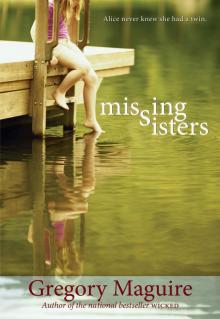 Missing Sisters
Missing Sisters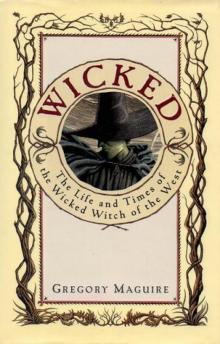 Wicked: The Life and Times of the Wicked Witch of the West
Wicked: The Life and Times of the Wicked Witch of the West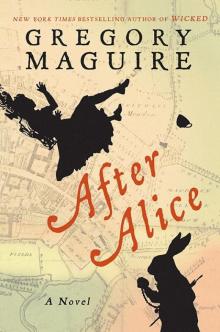 After Alice
After Alice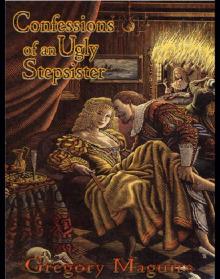 Confessions of an Ugly Stepsister
Confessions of an Ugly Stepsister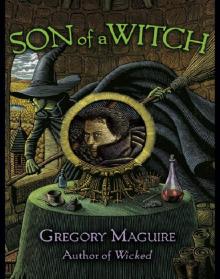 Son of a Witch
Son of a Witch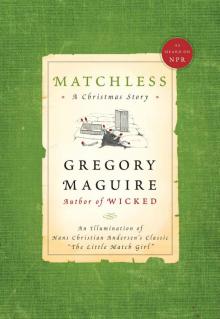 Matchless
Matchless The Next Queen of Heaven
The Next Queen of Heaven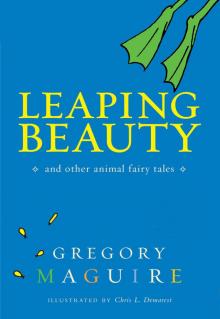 Leaping Beauty: And Other Animal Fairy Tales
Leaping Beauty: And Other Animal Fairy Tales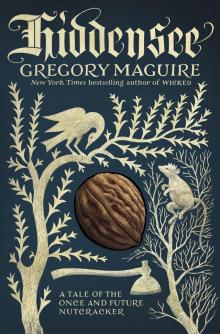 Hiddensee: A Tale of the Once and Future Nutcracker
Hiddensee: A Tale of the Once and Future Nutcracker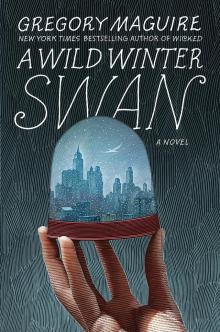 A Wild Winter Swan
A Wild Winter Swan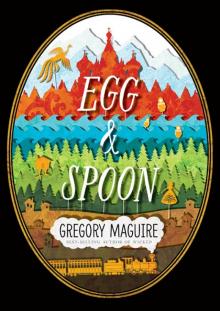 Egg & Spoon
Egg & Spoon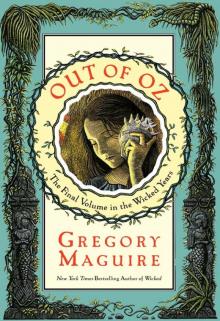 Out of Oz
Out of Oz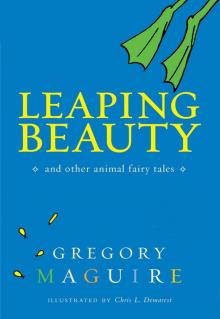 Leaping Beauty
Leaping Beauty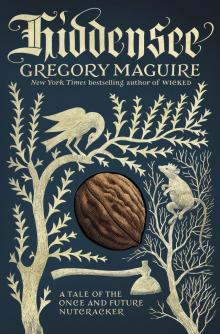 Hiddensee
Hiddensee The Wicked Years Complete Collection
The Wicked Years Complete Collection The Next Queen of Heaven: A Novel
The Next Queen of Heaven: A Novel